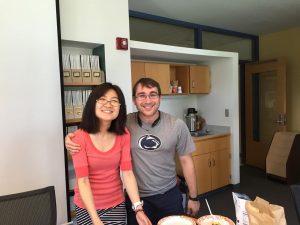Working in Melissa Rolls’ Cellular Neuroscience lab for the past 6 years has given me a unique understanding of an undergraduates’ scientific development. From an undergraduate researcher, to full time lab research technician, to PhD graduate student I have experienced each stage. I was lucky enough to be an undergraduate in a lab that truly, and I mean truly, values the contributions of their undergraduate researchers. Historically, many of the graduate student projects have been founded in undergraduate research. Our lab works with Drosophila, and we take a genetic approach to screen large numbers of genes in various imaging scenarios. This ends up being the perfect environment to introduce undergraduates to research. They can learn techniques, acquire data, and learn to think critically in a relatively quick manner. As an undergraduate in the lab I was the first mentee of Li Chen. Mentorship strategies vary between graduate students and Li Chen’s was one out of her own graduate advisor’s book. When I first interviewed in the lab Melissa told me that I didn’t need to know much about the work in the lab. She said that I could learn it all while working here. But one phrase that would be the theme of Li Chen’s mentoring was, “motivation is the key to success”. Self motivation for an undergraduate and a desire to answer the questions is the self sustaining force for any undergraduate and scientist in general. In my undergraduate experience there was a balance of discipline, teaching and self learning.
When I transitioned to a gap between undergraduate and graduate school, I began work as a full time research technician in the lab, and was given my first undergraduate. I did not know what to expect. Initially I realized how Li had felt with me as her first undergraduate. Overwhelmed and a bit unqualified to teach someone what I knew. Problems arise that you never expect. Conflicts in schedule, the learning curve, and balance between your own work and their work are just a few. But after awhile I began to adapt my strategy from how Li had mentored me. I wanted to give my undergraduate more attention than she had given me. I found that the way to train an undergraduate would be to have a period of hand holding for about 2-3 months. This seems like a long investment. In fact, it does distract from the work you can get done but it is well worth the extra time. After this period of personal attention I have found that undergraduates are able to complete all experiments, analyze data, and start to think critically about their results. This obviously varies from person to person. It all boils down to that self motivation that was stressed so much to me in my undergraduate experience. After my first undergraduate’s successful transition into research, Melissa gave me a few more undergraduates and after awhile my team had grown.

In total the undergraduates I was mentoring at once had grown to more than a dozen. Because I had trained so many I developed three modules in the beginning of the training for new members. These modules allowed information to be given in packets like a class so they did not become overwhelmed with information. The key to keeping track of the various projects was to meet regularly with them in groups. Breaking the undergraduates up into groups provides them with experience working in a team as well as developing their individual project. The most beautiful thing about undergraduate research is the symbiotic nature of the relationship. Undergraduates seeking to acquire experience for graduate school need to do research and if it is good, the research seeds future directions for the lab. This has been the case for many of the undergraduates I have mentored. In addition I have gained invaluable skills toward teaching science to others. In total I have trained close to two dozen undergraduates, three technicians and a few graduate students. Thus these mentoring strategies are translatable to other developmental stages in research. My experience now as a graduate student has taught me a lesson. If graduate students are the pistons, then a well trained team of motivated undergraduates provides the oil so the machine can run just that much more smoothly.
The Rolls lab is always willing to accept new motivated undergraduates. Please contact Melissa Rolls at mur22@psu.edu


